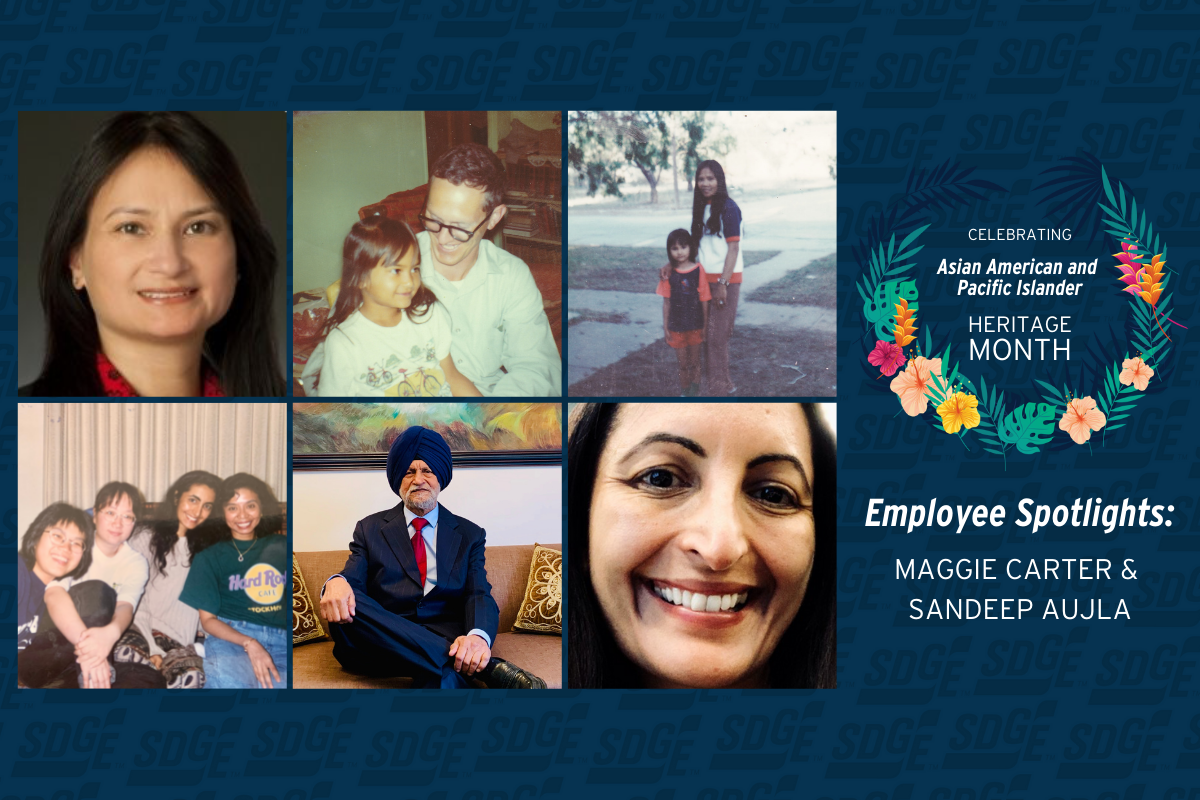As Asian American and Pacific Islander (AAPI) Heritage Month nears an end, let’s continue to listen to and learn from one another; let’s foster allyship and cultural understanding. Now, please join us in our Q&A with Maggie Carter, our Director of Diversity & Inclusion, and Sandeep Aujla, our Senior Sustainability Manager, as they share their stories on the role their AAPI heritage plays in their lives.
How do you identify within the Asian American and Pacific Islander community and what impact has your identity made in your everyday life?
Maggie Carter: I am bi-racial, my mother is from the Philippines and my father is white. My father was in the military, so we moved around quite a bit. From the ages of 11 to 14, my family lived in the Philippines. Although I saw families living in homes made of plywood walls and tin roofs, I also saw the same families and children laughing and playing in dirt streets. This experience had a significant impact on me. I live with gratitude every day and realize people live differently all over the world – not good or bad, just differently.
Sandeep Aujla: I am an Indian woman who grew up in a conservative Sikh household in Delhi and left India in 1995 to pursue graduate studies. Stepping foot on my first plane to Melbourne, Australia, a country where I did not know a single soul, and moving to the US in 1996 to complete my Masters in Rochester was not an easy process. I got my first job with Hewlett Packard in the Bay Area, where my green card was processed to open the door for me to pursue my American dream. Along this path, I met many other global community members and fellow AAPI members who served as role models and invaluable guides. Reflecting on my journey and the journey of many immigrants inspires an intergenerational worldview of courage and compassion. This same reflection helps me share and instill some of my cultural values in my children without any pressure to conform. I also learned a lot from my dad, who built his life from scratch after fleeing Pakistan in 1947 to create a successful future which inspired my ambition to follow my dreams with humility and quiet determination. I never have or will forget where I came from and where I am going.
Does your family have any cultural traditions that are especially important to you?
Maggie Carter: A highlight of having parents from different cultures is the holidays! We celebrate with a full spread of traditional American foods like turkey and mashed potatoes along with Filipino dishes like lumpia and pancit.
Sandeep Aujla: I am very proud of my Indian heritage, the Sikh traditions, and the teachings I was raised with. First, the traditional five-day Sikh wedding in Delhi, which in my case was an intercultural, interfaith, and interracial marriage, included many friends and family from different parts of the world. Memories of my wedding will be forever treasured by all that attended, from Middleville, Michigan to Melbourne, Australia! Another annual tradition that I have held onto is celebrating Diwali, which is celebrated with the same fanfare as Christmas by all Indians. During Diwali, you light diyas (clay/mud lamps) no matter where in the world you are to celebrate the victory of light over darkness.
In your opinion, what value does diversity - of all types - bring to organizations?
Maggie Carter: Beyond the research that shows diverse perspectives lead to better problem identification/solving, a competitive advantage, and increased profitability - for me, it makes work (and life) more enjoyable and interesting. I’m so grateful to work with colleagues that have different opinions than mine, and I find that engaging with others leads to better outcomes.
Sandeep Aujla: The most significant value diversity brings to organizations is engendering and fostering open-mindedness. Diverse backgrounds often result in different ways of thinking, processing information, and reacting. This diversity of thought is key- not only to innovation, but often to compassion and friendly conflict resolution.


